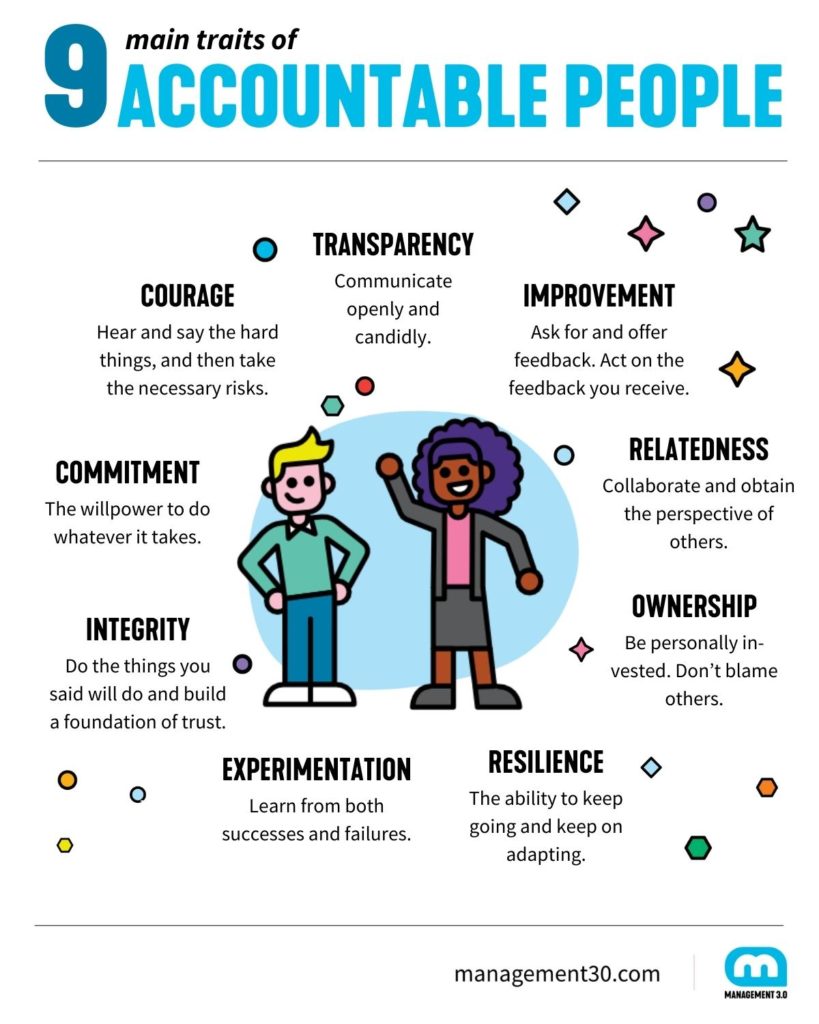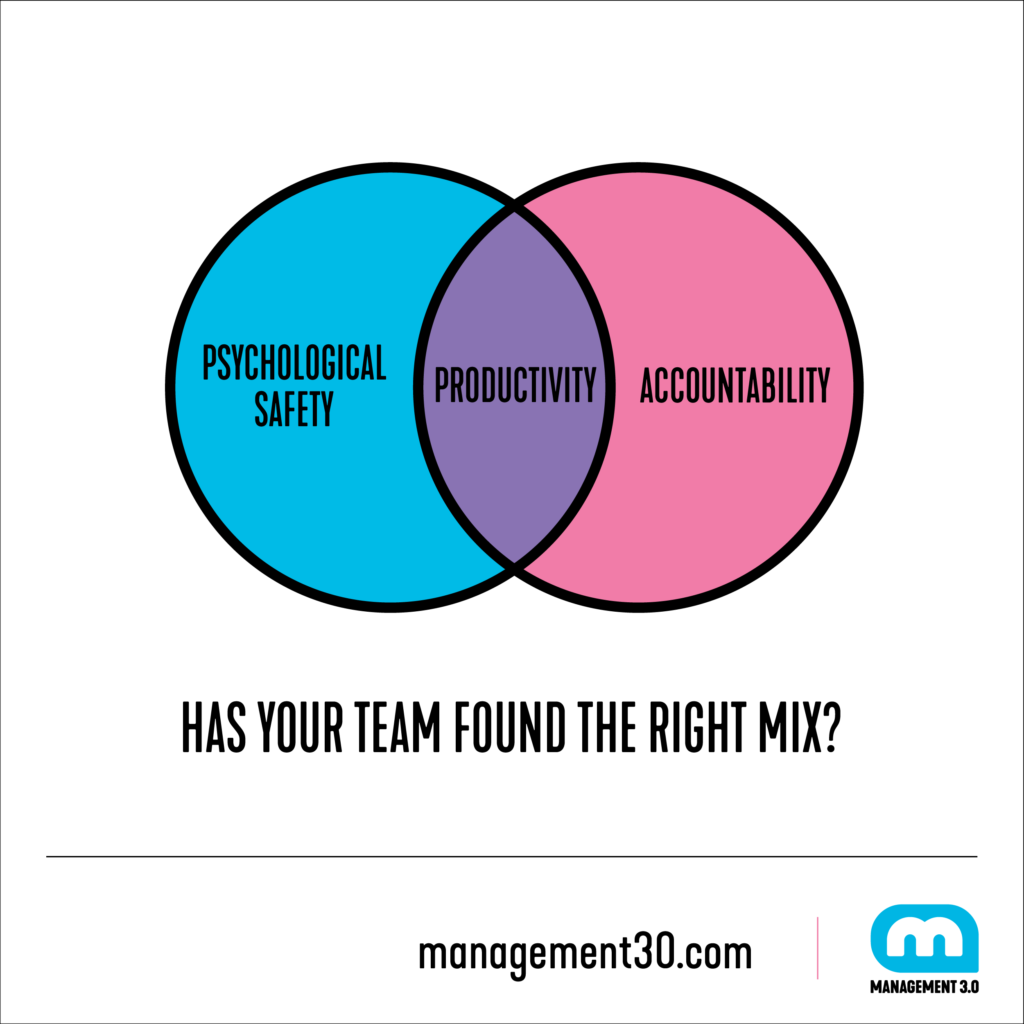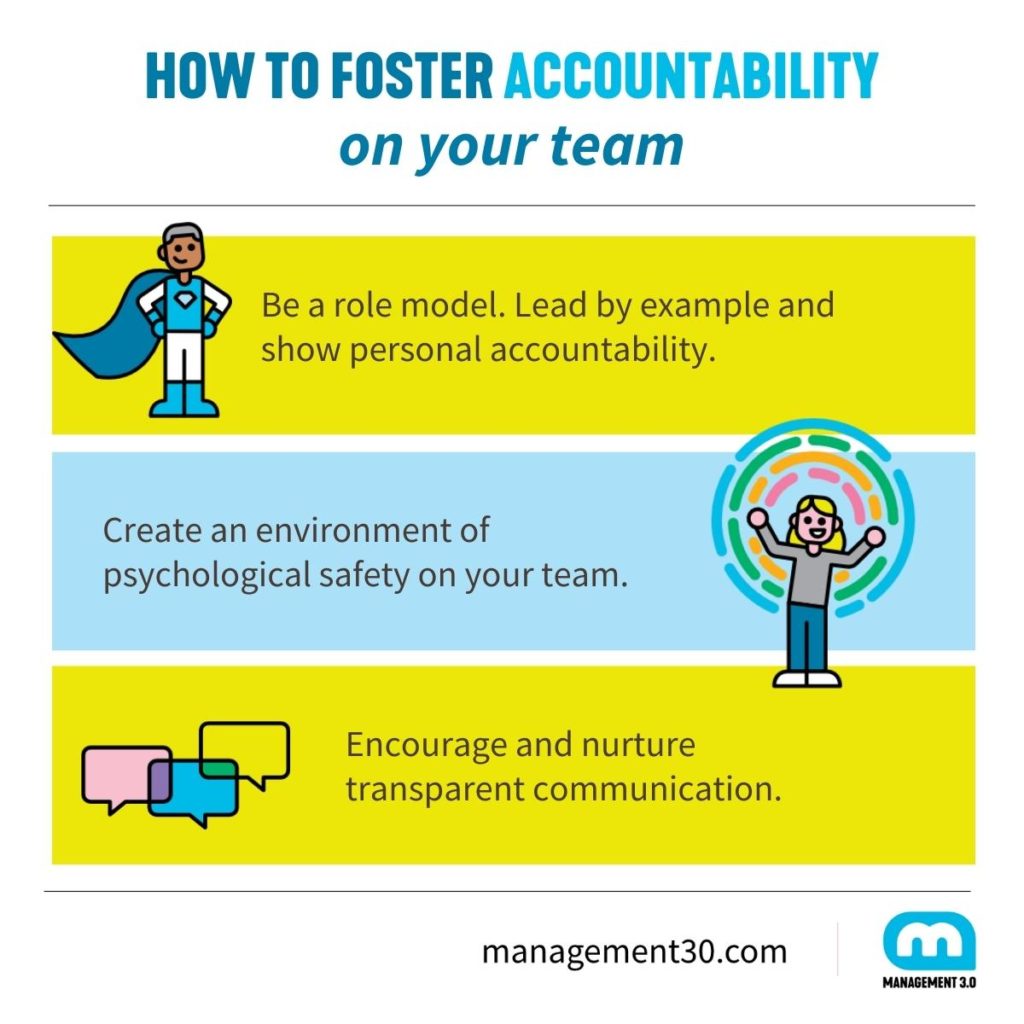Ilija Popjanev, experienced business professional, leader, trainer and coach, Management 3.0 facilitator, passionate for developing people and organizations and getting measurable results, is sick of the blame game. Instead, he is all in for more accountability in our teams!
We must hold our people more accountable! How often have you heard this workplace mantra? Probably very often. Anytime we can’t release the sprint or meet our goals, targets, and numbers, whenever people constantly repeat the same mistakes, or the quality of work isn’t acceptable, we hear it over and over.
We address the accountability issue in hundreds of situations and, most of the time, when things aren’t going well. Is the root cause of some underlying problem or maybe unclear roles and responsibilities, limited resources, or unrealistic goals? Who knows?
On the other hand, our teammates perceive this as We have failed! How did this happen? Who’s fault is it? etc. Maybe our intentions were good, but we’re causing frustration and disengagement among our people. We have to energize our people and make them thrive. So let’s start with accountability!
What does it mean to hold your teammates accountable?
First, let’s check what accountability is not.
- Accountability is not a set of tasks you have to finish on time,
- it’s not a tool to blame people and instill fear,
- it’s not simply saying “It’s my fault. Blame on me!”,
- it’s not about the outputs.
Accountability is about the outcome and delivering the results! You can’t confess and take the blame, you have to deliver on the commitment!
Recently this interesting article was published: How can we build psychological safety to achieve more together? It explains the correlation between accountability and psychological safety, and the importance of keeping them in balance and constantly growing if you want to build a learning organization.
According to the Oxford Dictionary, accountability means the fact of being responsible for your decisions or actions and expected to explain them when you are asked.
I personally like the meaning of accountability described in the book The wisdom of OZ, by Roger Connors, where he defines accountability as a personal choice to rise above one’s circumstances and demonstrate the ownership necessary for achieving desired results to See It, Own It, Solve It, and Do It.
A great analogy with the Wizard of Oz story, where Dorothy and her companions (the Lion, the Tin Man, and the Scarecrow) are constantly looking for someone else to provide the answers and solutions to the challenges they face.
On the other hand, my personal view is that accountability is a mindset. It’s our system of values and strong beliefs, our way of thinking, and the actions we’ll take to meet our goals.
We have to foster the mindset of highly accountable people in the team. These people always go the extra mile, always step up. They’re usually saying – I don’t know how to do that, but I‘ll try anyway.
When we speak about instilling accountability in our team, we must have the courage (the Lion) to see the obstacles before they arise. We must have heart (the Tin Man) and accept ownership of these challenges, even if they aren’t directly related to our work. We must have the wisdom (the Scarecrow) to solve these obstacles by finding solutions even when they aren’t visible at the moment. Finally, to have the willpower (Dorothy) to do and deliver the working solution.
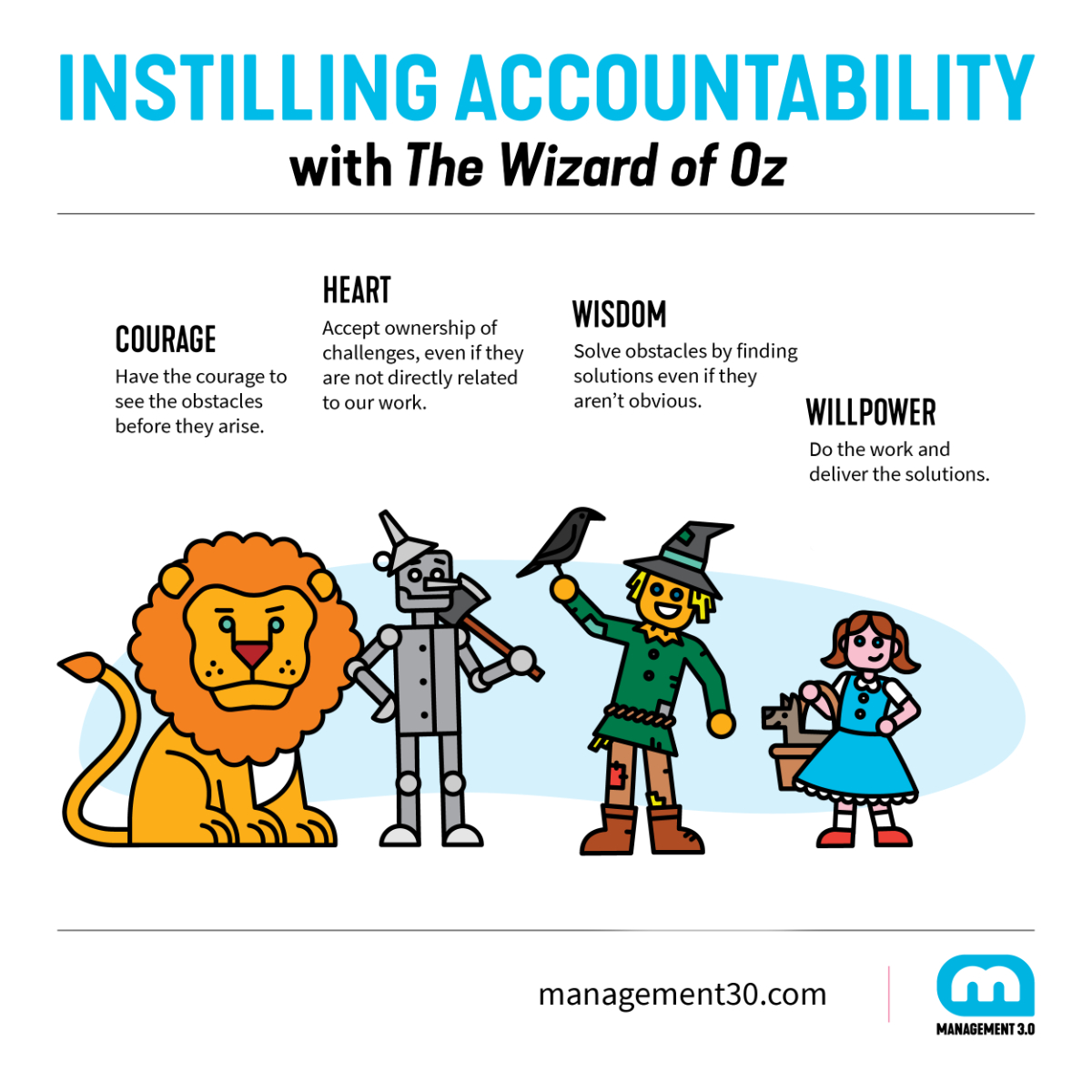
How do leaders hold employees accountable?
Leaders and managers must create a psychologically safe system and instill values such as courage, transparency, ownership, and commitment. A system where teammates can see problems, take ownership to solve them, deliver solutions that may fail, but they won’t be punished or judged by the managers.
Commitment is super important. It’s the willpower to do whatever it takes. We can’t force people to do things, they must have a high level of willingness to perform successfully.
Here are the main traits of accountable people, something leaders have to work on with their team.
- Courage – Hear and say the hard things, and then take the necessary risks.
- Transparency – Communicate openly and candidly.
- Commitment – The willpower to do whatever it takes.
- Ownership – Be personally invested. Don’t blame others.
- Integrity – Do the things you said you will do and build a foundation of trust.
- Relatedness – Collaborate and obtain the perspective of others.
- Experimentation – Learn from both successes and failures.
- Improvement – Ask for and offer feedback. Act on the feedback you receive.
- Resilience – The ability to keep going and keep on adapting.
Leaders can experiment with Management 3.0 tools Moving Motivators, to help the team find the qualities of accountable people and then foster those values with personal examples.
The Feedback Wrap has an effective structure and elements, which can help in the improvement process. Building the culture of honest giving and receiving feedback is the start of building the learning organization and leaders can agree about the power a simple feedback can give.
Why is it important to hold your team accountable?
Accountability can be given, asked, requested, but it cannot be pushed or forced. That’s why I don’t believe much in the I hold you accountable approach. We all know that managers always demand accountability, but from the other side, accountability can be offered even if it isn’t requested.
I can show you how I set my Miro board yesterday! is an offer of accountability, and leaders can offer accountability to demonstrate their trustworthiness to encourage their team mates to be better, to have better discussions, and to hold each other accountable in a supportive way, as true partners.
When we use the right approach, accountability triggers intrinsic motivators which inspire people to exceed team objectives, performance and results. To do the extra mile. To get fully engaged.
That’s why fostering the accountability mindset and values is essential if we want to bring the team to high performance and build better relationships, synergy, co-working, and engagement.
If you want to foster accountability in your team, get started by:
1. Being a role model. Lead by example and show personal accountability!
To hold your team accountable, isn’t possible without starting with yourself. Show personal accountability as a role model, leading by example, before holding your teammates accountable in the first place.
Start by reducing your excuses and procrastination. Be bold, assertive, and take risks. Build your willpower day by day and the new you will be noticed by your colleagues.
Here you can create a Happiness Door and ask your teammates to give you honest feedback regarding your behavior. Monitor the progress and improve on a daily basis.
Accountability is like muscle – you have to work on it every day to make it stronger. Practice accountability during daily meetups and all team events, during lunch, and at the water cooler.
2. Creating psychological safety in your team!
Previously we looked at some of the traits of accountable people such as courage, commitment, integrity, etc… but according to the Scrum Guide and Amy Edmondson, trust and psychological safety are crucial when fostering accountability in the team. Without them, your teammates won’t feel comfortable to open up, take ownership, or be transparent and candid.
You can easily improve creativity, innovation, risk taking, feedback culture, blame game elimination… when you create a psychologically safe environment.
Explore more about psychological safety by reading the book The Fearless Organization by Amy Edmondson and start experimenting and adopting on a daily basis.
For that purpose, I recommend implementing a very powerful Management 3.0 practice – Personal Maps. By sharing personal details about yourself, you can create a safe space for the team to open up and share things about themselves. Keep in mind that vulnerability and trust don’t develop instantly, so give your team time to build trust in each other and the transparency and openness will increase day by day.
3. Fostering transparent communication and share inspiring stories
Accountability should flow in every direction. Top-down, but also bottom-up, horizontal, peer-to-peer, inside-out and outside-in. We need to ask for accountability from all stakeholders, and that’s why we need transparent communication. We discussed the power that honest feedback can bring to the team. Now we want to go deeper with storytelling and mentoring.
Leaders need to tell stories. Stories are powerful. Leaders must give positive examples of team members addressing accountability concerns by holding leaders accountable, mostly when they’ve taken a risk. Storytelling is the best way to make leadership influence happen. One great way to foster this is using Management 3.0’s Improv Cards (available for purchase or for free online). They encourage bonding, engagement and a lot of fun. Try it ASAP!
But also, have in mind that leaders are great mentors, too. So try to practice accountability during your ceremonies, ensure the team works on real-life examples, something just happened recently.
Practice accountability during team events, retrospectives, etc. For example, using the Management 3.0 tool Celebration Grid you and your colleagues can share good and bad examples of accountability using recent, real-life events that have happened. Good things like: The client was very thankful that I followed up with them. And not-so-great things like: Nobody told me, it’s not my job. Then, note the main excuses people have in terms of accountability and discuss some alternate things they could try.
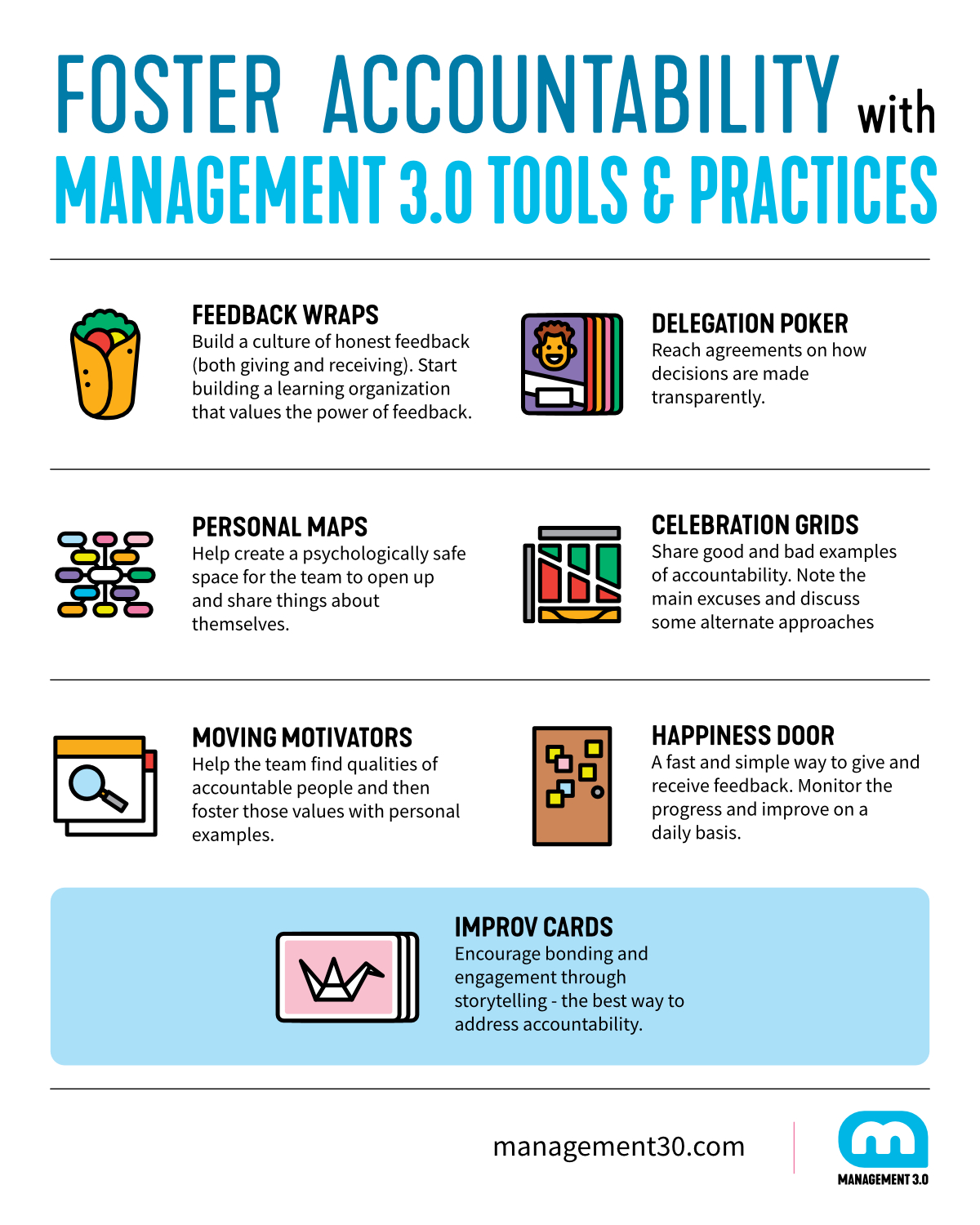
How can team members hold each other accountable?
We can’t be accountable if we don’t have the ability to take ownership. When we ask people to hold each other accountable, we need to ask ourselves:
- Was I clear about my expectations?
- How can I help more?
- What is my relationship with them?
We need to work a lot on reducing the blame game, excuses and judgment. That’s why taking ownership for the results is so important.
When we’re building strong, self-managed teams and agile culture, accountability is super important. That’s why in the last version of the Scrum guide the roles are replaced with accountabilities. Everyone in the team must be on the same page and clearly understand all tasks, objectives, and tools, etc.
Gather your team and discuss what accountability means to each person. Use the Celebration Grid so everyone can share some examples of accountability, and which activities lead to success, which to failure, what is working well, what isn’t, and what to try next.
By collecting the team insights you’re building the new team standards and principles, so all team members will be on the same page.
One super simple way to do this is through daily or weekly check-ins, where teammates share updates on what they’re working on, what they need from the rest of the team, and how they’re doing.
Additionally, you can encourage everyone to hold each other accountable for important objectives, commitments, or experiments you’re working on in the next few days. Then receive the Feedback Wraps from your teammates and take ownership over the impact of your actions.
This process helps a lot in creating the accountability mindset, team cohesion, and holding each other accountable even without the presence or leaders or managers. You can improve accountability and ownership by using Management 3.0’s Delegation Poker (also available for purchase or for free online.) With it you will align the perspective of the managers with those of the team, reach agreements on how decisions are made in a transparent way. Then watch the level of commitment, ownership, and accountability go up!
Also read: Team Agreements for high-performing teams
Keep in mind accountability is one of the most talked about, yet most misunderstood concepts in leadership today. Organizations are still measuring and controlling performance, but performance is not a good success factor. Accountability is.
So remember, use the power of your team, use the tools mentioned above, be more open and transparent in expressing your commitments, be more empathic, and listen more to others.
If you do these things, I’m confident you’ll increase the accountability level in your team, and build the desired learning organization.
I’d like to finish this article with one very old but still relevant quote from Molière:
It is not only what we do, but also what we do not do, for which we are accountable.
Header Photo by Anna Shvets (via Pexels)

